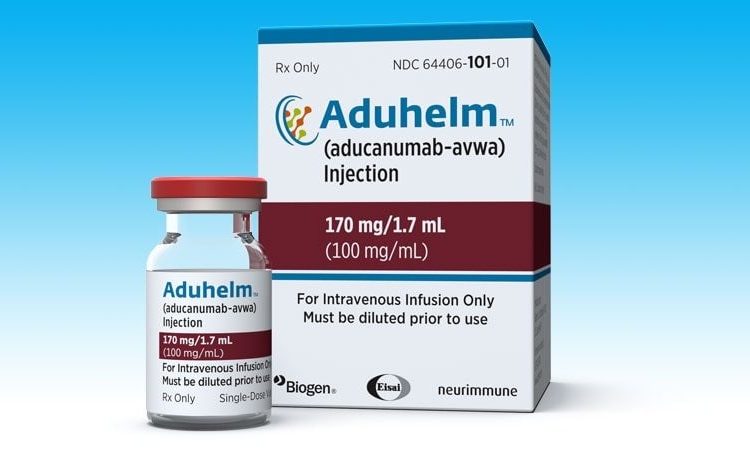New data released by Biogen this week show that long-term treatment with aducanumab (Aduhelm) continues to reduce the underlying pathologies of Alzheimer’s disease (AD) after more than 2 years of treatment.
Patients receiving aducanumab in the long-term extension phase of two phase 3 trials (ENGAGE and EMERGE) continued to experience significant reductions in amyloid beta plaque (P < .001) levels out to week 132 (2½ years) and plasma p-tau181 levels (P < .001) out to 128 weeks, the company said.
Patients with more effective amyloid beta clearance (standardized uptake value ratio [SUVR] <1.1 by 78 weeks) also showed greater declines in p-tau181 at week 128.
“These findings point to the potential of continued benefit of treatment in the longer term with continued reduction of amyloid beta plaques,” Biogen said in a news release.
In addition, in both studies, at 78 weeks, patients with a reduction in plasma p-tau181, an exploratory endpoint, had less clinical progression across all four clinical endpoints measuring cognition and function than peers whose plasma p-tau181 levels were not reduced.
As reported by Medscape Medical News, earlier data from EMERGE and ENGAGE also linked p-tau reduction with less cognitive decline.
No Clinical Benefit?
The new biomarker data were presented March 16 at the International Conference on Alzheimer’s and Parkinson’s Diseases (AD/PD 2022) in Barcelona, Spain.
“These are meaningful findings, which further our understanding of amyloid and downstream biomarkers, such as p-tau181, in Alzheimer’s disease and can help inform how long patients may benefit from treatment to reduce amyloid beta plaque,” study investigator Samantha Budd Haeberlein, PhD, SVP, head of neurodegeneration development at Biogen, said in the news release.
However, the surrogate endpoint of amyloid clearance used in the trials has been challenged by multiple experts, including three members of a US Food and Drug Administration (FDA) advisory committee who resigned following the drug’s approval, saying there was insufficient evidence that amyloid-beta clearance results in clinical benefit.
Concerns about potential side effects of aducanumab also linger — in particular, amyloid-related imaging abnormalities related to edema (ARIA-E).
Haeberlein reported that integrated safety data from the two trials suggest ARIA-E is most commonly mild (68%) or moderate (28%) in radiographic severity and mostly asymptomatic. Most ARIA-E events (98.2%) resolved on study, with the majority resolving within 12-16 weeks.
“We will continue to provide physicians with efficacy and safety data to help them make the best treatment decisions for patients as we learn from our ongoing trials and real-world evidence,” Haeberlein said.
Only One Piece of the Puzzle
A spokesperson for Biogen told Medscape Medical News the company is “advancing the development of the postmarketing requirement study that was part of the [FDA’s] accelerated approval process.”
On that front, the company has announced that they will start screening patients in May for the phase 4 confirmatory study known as ENVISION, with primary readout of data 4 years after that.
Long-term outcomes of aducanumab treatment are currently being investigated in the phase 3b EMBARK study.
Another study called ICARE AD-US is collecting longitudinal clinical, imaging, and pharmacoeconomic data to evaluate the safety and effectiveness of aducanumab in real-world clinical practice.
Howard Fillit, MD, co-founder and chief science officer of the Alzheimer’s Drug Discovery Foundation (ADDF), looks forward to additional data on aducanumab, particularly in terms of clinical benefit.
The long-term phase 3 data “continues to show a robust effect of Aduhelm on amyloid and tau proteins, two important Alzheimer’s biomarkers, but we need more clinical data to know whether and to what extent Aduhelm actually benefits patients,” Fillit said in a statement sent to Medscape Medical News.
“Anti-amyloid drugs like Aduhelm are just one piece of the puzzle,” contends Fillit. “Today’s diverse research pipeline — powered by the biology of aging approach, the understanding that many biological processes contribute to Alzheimer’s disease as we age — is focused primarily on developing therapies that target the many other underlying causes of this disease, like inflammation and vascular dysfunction. Only by attacking Alzheimer’s on multiple fronts will we be able to effectively conquer this disease.”
The EMERGE and ENGAGE studies were sponsored by Biogen. Biogen played a role in the design and conduct of the study as well as the collection, analysis, and interpretation of data. Haeberlein is an employee of Biogen. Fillit has disclosed no relevant financial relationships.
International Conference on Alzheimer’s and Parkinson’s Diseases (AD/PD 2022). Presented March 16, 2022.
For more Medscape Neurology news, join us on Facebook and Twitter
Source: Read Full Article
